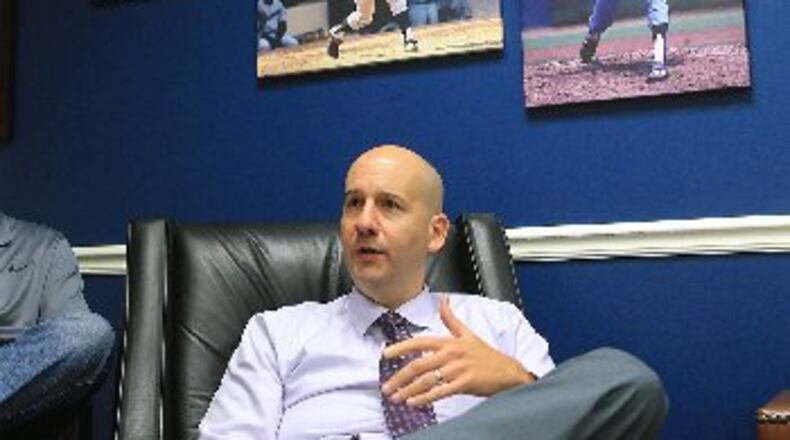Braves general manager John Coppolella is in his first year of getting beat up publicly for trades that seem to make no sense to everybody else. So it figured at some point he would pop, and he did.
After several days of criticism from fans and media over trading shortstop Andrelton Simmons to the Los Angeles Angels, and then Simmons himself suggesting the Braves care more about dumping high salaried players than winning now, Coppolella denied the team is tanking today for the hope of a better future.
In an interview with USA Today's Bob Nightengale on the eve of today's baseball quarterly owners meetings in Dallas, Coppolella said, "Trust me, we are not tanking."
He also again denied rumors/speculation/reports that the team is shopping first baseman Freddie Freeman, saying: “I cannot make it any more clear: We are not trading Freddie Freeman. We are not. I’d give my right arm before we trade Freddie Freeman. It is not happening."
So if the Braves deal Freeman this winter and Coppolella shows up the next day missing an arm, don't say you weren't warned.
[cmg_cinesport url="http://cinesport.ajc.com/embed/ajc-atlanta-sports/schultz-buying-what-braves-are-selling/"]
"Tanking" is such an ugly word, but it's a reality of sports. It suggests management intentionally strips down a roster so the team will lose a bunch of games, setting up the organization for a higher draft pick. Tanking also often includes stripping a roster of most veterans and replacing them with inexpensive young players and spare parts that no other team really want. Trading high-salaried players minimizes financial losses with the anticipation of drops in attendance, sponsorships and other sources of revenue (which all might be the case with the Braves next season).
Players don't "tank" or lose intentionally because they have nothing to gain by it. They might, however, become so disenchanted with management's approach to roster building that their enthusiasm wanes and it affects their on-field performance.
The Simmons' deal made little sense for this reason: Even if Coppolella's objective is to deal players with big contracts and continue to acquire pitching prospects, Simmons had salary control for the next five years. Also, his salary was not considered ridiculous for a player who most believe is the best shortstop in baseball. For that reason, of all the high-profile deals Coppolella and president of baseball operations John Hart have made in the past year and a half, the trades of Simmons and young left-handed pitcher Alex Wood (who's making relative peanuts and isn't eligible for free agency until 2020) made the least sense. Wood was dealt in a multi-player deal for Hector Olivera, who will be 33-years "in a few years," to use Coppolella's timeline.
The widespread belief is that Coppolella is trying to follow the blueprint of the Chicago Cubs and Houston Astros, who were among the worst teams in the majors for years while they stocked the organizations with prospects. Both teams made the playoffs this past season.
Simmons also took some veiled shots at the Braves after the trade, saying, "I didn't expect it but if you see what's happening in Atlanta ... you won't be surprised when you hear it's happening." And then the knockdown punch: "I'm happy to be part of an organization that's trying to win, win right now."
There is no evidence the Braves are trying to win now. Coppolella all but admitted that when he told Nightengale, "If you want to take shots, or (degrade) us, fine. But let’s let it play out for a few years before we start branding our pitchforks and torches."
"A few years," he said.
I'll translate: "Pay no attention to the product that will be on the field this season or maybe next season."
Coppolella says that isn't tanking. I call that semantics.
•
About the Author
Keep Reading
The Latest
Featured


